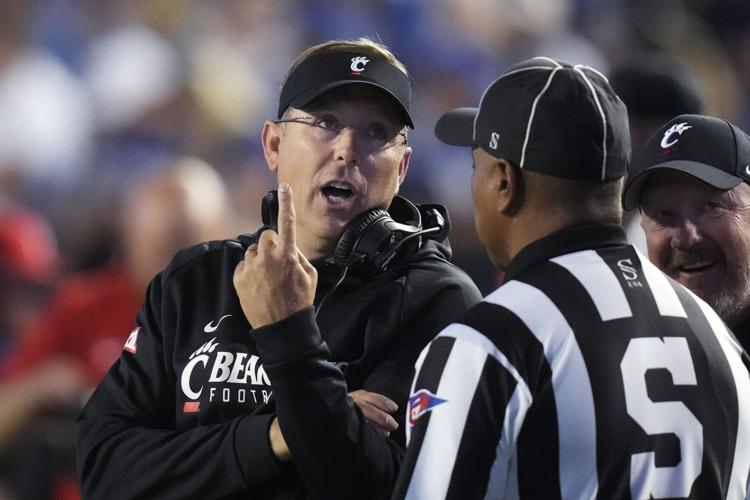In a surprising turn of events, the Big 12 Conference has taken disciplinary action against Cincinnati Bearcats head coach Scott Satterfield, imposing a $25,000 fine and issuing a warning for his inappropriate behavior during a recent game against Colorado. This incident highlights the increasing scrutiny college coaches face regarding their conduct, both on and off the field.
The controversy erupted during a high-stakes matchup that had significant implications for both teams. Following a personal foul penalty involving Cincinnati’s standout player, Dontay Corleone, Satterfield reportedly lost his composure and yelled “f*** you” three times in the heat of the moment. This outburst was not only uncharacteristic of a head coach at a prominent program but also demonstrated a lack of professionalism that the Big 12 clearly found unacceptable.

The Big 12’s decision to fine Satterfield underscores a broader trend in college athletics where conferences are taking a stand against misconduct. With the increasing visibility of college sports and the corresponding pressure on coaches to maintain composure, the conference is sending a message that such behavior will not be tolerated. This is particularly important given the influence coaches have over their players and the culture they help create within their programs.
Satterfield’s actions were particularly disappointing considering the context of the game. Coaches are expected to be role models for their players, and Satterfield’s outburst could have far-reaching implications for the perception of his program. It raises questions about how he handles adversity and pressure, especially in a competitive conference like the Big 12.
Moreover, this incident serves as a reminder of the fine line coaches walk during games. Emotions can run high in college football, and the stakes are often astronomical, with players, fans, and institutions heavily invested in the outcomes. However, coaches must remain composed and set an example, not only for their players but also for the younger fans who look up to them.

The $25,000 fine is a substantial amount, particularly for a program still adjusting to the challenges of competing at a higher level in the Big 12. Satterfield, who was brought in to help elevate Cincinnati’s football program, now faces the added challenge of rebuilding trust and respect among his players and the community after this incident. The road ahead will require not only a focus on winning games but also an emphasis on instilling the values of sportsmanship and professionalism in his players.
As the college football landscape continues to evolve, with increasing media scrutiny and a heightened awareness of behavioral expectations, coaches like Satterfield must navigate these challenges with care. The Big 12’s response to this incident is a clear indication that conferences are committed to upholding standards of conduct and ensuring that their coaches exemplify the ideals of the sport.
In conclusion, Scott Satterfield’s recent fine and warning from the Big 12 serve as a wake-up call for coaches across the nation. As the lines between passion and professionalism blur, it is imperative for coaches to model appropriate behavior, ensuring that the integrity of college football remains intact. Moving forward, Satterfield will need to demonstrate that he can learn from this experience and continue to foster a positive environment for the Cincinnati Bearcats both on and off the field.





